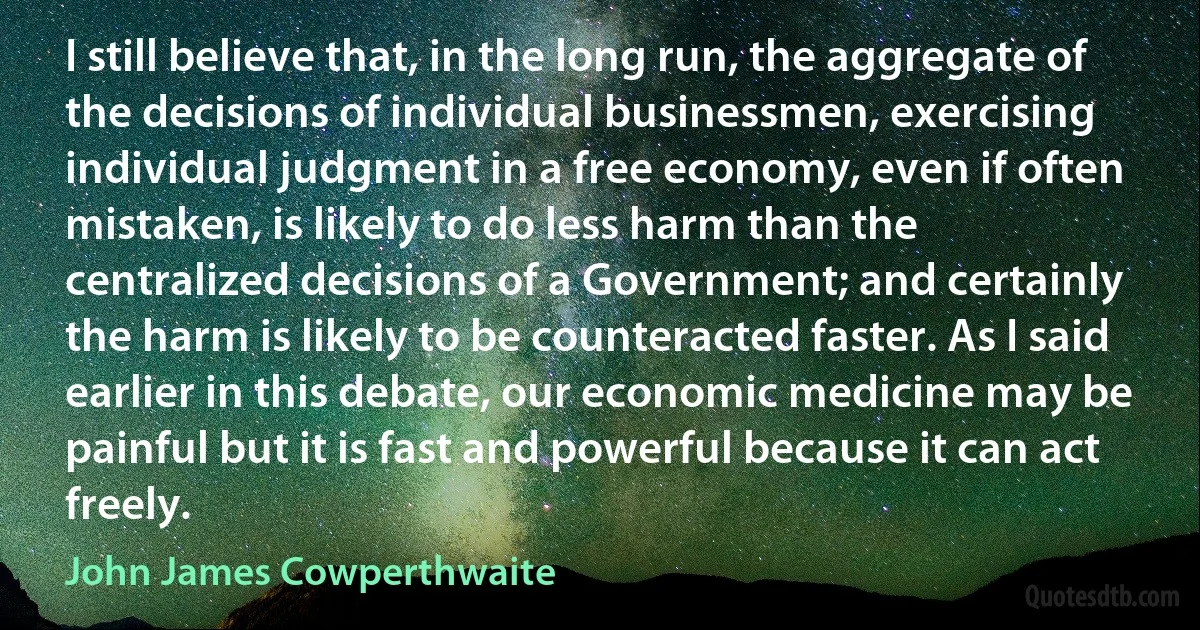John James Cowperthwaite quotes
I largely agree with those that hold that Government should not in general interfere with the course of the economy merely on the strength of its own commercial judgment. If we cannot rely on the judgment of individual businessmen, taking their own risks, we have no future anyway.

John James Cowperthwaite
I hold that two principles are important; first that there should be a steady expansion of public services, not an irregular one related to revenue accruing in any particular year; the second that taxes should be constant over long periods (provided, that is, that they are neither burdensome nor inequitable).

John James Cowperthwaite
Official opposition to overall economic planning and planning controls has been characterized in a recent editorial as "Papa knows best." But it is precisely because Papa does not know best that I believe that Government should not presume to tell any businessman or industrialist what he should or should not do, far less what he may or not do; and no matter how it may be dressed up that is what planning is.

John James Cowperthwaite
Over a wide field of our economy it is still the better course to rely on the nineteenth century's "hidden hand" than to thrust clumsy bureaucratic fingers into its sensitive mechanism. In particular, we cannot afford to damage its mainspring, freedom of competitive enterprise.

John James Cowperthwaite
The fact that previous generations have handed down to us a substantial public heritage by way of roads, port, etc. almost completely free of debt, seems to me to impose some limitation on the validity of the theory that by borrowing we should, or could, pass on the burden of development to the next generation.

John James Cowperthwaite
Deficit financing proper is rather the process whereby a Government spends more money that it withdraws from the economy by taxation, borrowing, running down reserves, etc.; thereby causing in most circumstances, and very acutely in ours, monetary inflation and severe pressure on the balance of payments.

John James Cowperthwaite
I must confess my distaste for any proposal to use public funds for the support of selected, and thereby, privileged, industrialists, the more particularly if this is to be based on bureaucratic views of what is good and what is bad by way of industrial development, but I have been studying the report referred to with some interest.

John James Cowperthwaite
What gives me concern in so much of the comment is the implication that the people of Hong Kong have to be given a reward, like children, for being good last year, and bribed, like children, into being good next year. I myself repudiate this paternalistic, indeed colonialist, attitude as a gross insult to our people.

John James Cowperthwaite
If people want consultative government, the price is increased complexity and delay in arriving at decisions. If they want speed of government, then they must accept a greater degree of authoritarianism. I suspect that the real answer is that most people prefer the latter so long, that is, as government's decisions conform with their own views.

John James Cowperthwaite
We enjoy a considerable net inflow of capital and I am sure that a condition of its coming, and staying, is that it is free to flow out again. It is also important for Hong Kong's status as a financial centre that there should be a maximum freedom of capital movement both in and out.

John James Cowperthwaite
Many of our services cost more than do similar services in Europe, because, although we have a substantial quantitative deficiency of public services, the decision-takers and policy-makers, both inside and outside Government as I have said before today, being themselves from the better-off (to use a popular euphemism) sectors of our society, not only demand the highest standards of provision of public services to meet what they consider their own essential needs (for example, in public car parks); but also find it difficult to think of provision for the rest of the population in terms of standards relative to our real total resources.

John James Cowperthwaite
I find odd the view that a Government institution is better placed to evaluate "the technical and financial viability" of a project than a commercial bank. It may well be that our banks are deficient in the kind of expertize required for assessing projects but then what we should be doing is encouraging banks to acquire such expertize or to make use of outside, commercial, expertize. I do not believe in any case that a Government machine can provide a reliable judgement on such matters, an opinion the banking members of the committee appear to have shared, for they have prudently refused to commit themselves to accepting its advice. I myself tend to mistrust the judgement of anyone not involved in the actual process of risktaking.

John James Cowperthwaite
If one accepts that in general social services should be made available to all on the basis of ability to pay, one has the choice of two opposite principles of action, although they need not be mutually exclusive-either progressive taxation and free services or fees covering costs with remission for those who cannot afford them. The former method is appropriate, in my view, in rich developed countries where the principle of progressive taxation can be applied without unduly adverse economic or social results, and the wastes inherent in full and free services can be afforded. In less advanced or poorer countries, where neither economy nor society is geared to progressive taxation and waste cannot be tolerated, fees remittable in case of need seem to me clearly more appropriate.

John James Cowperthwaite
John James Cowperthwaite
Born: April 25, 1915Died: January 21, 2006
Quotes count: 34
Wikipedia: John James Cowperthwaite






